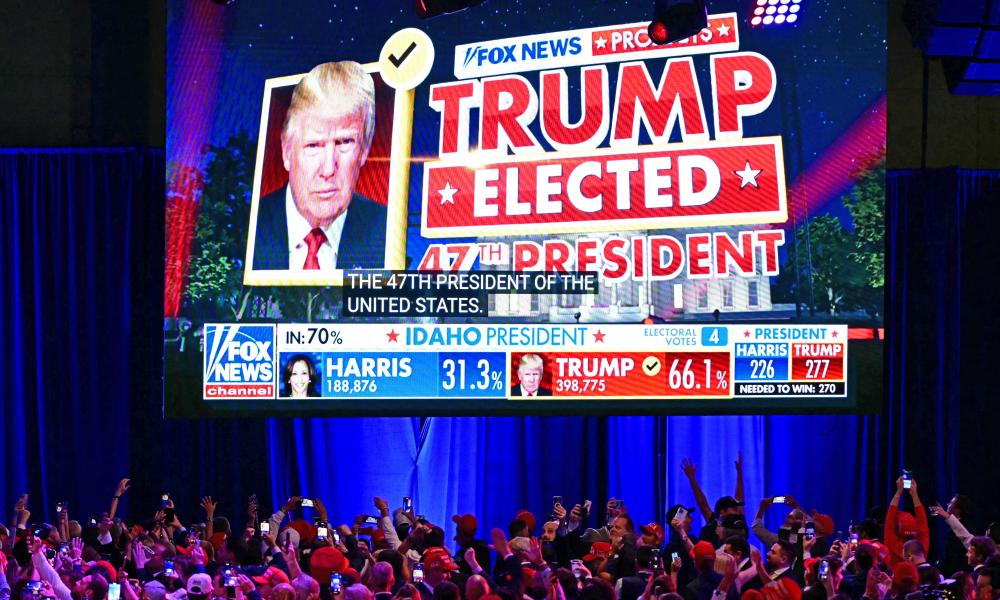In the early hours of a pivotal election night, a raucous atmosphere filled a convention center in West Palm Beach, Florida, as Donald Trump’s supporters celebrated the news that he had secured Pennsylvania, a key state in the presidential race. Glee erupted among the crowd—an assembly of perhaps predictably tanned and bejeweled attendees, adorned in red MAGA caps and outfits replete with patriotic decor. As the Fox News banner flashed Trump’s victory, chants of “USA! USA! USA!” filled the air, underscoring a profound conviction among the attendees, who viewed this moment as a decisive turning point not just for Trump, but for the future of America. The night presented itself as a celebration of resurrection for a once down-and-out candidate who, despite legal controversies and impeachment, was now positioned to reclaim the White House.
The attendees reveled in the implications of Trump’s anticipated victory, signaling a rebuke of the Democratic Party and a perceived vindication of their favorite candidate. The party atmosphere was a blend of jubilation and defiance, as participants dismissed critical labels of “fascism” being assigned to Trump and his administration. The collective sentiment favored a robust stance on immigration and an economic strategy they believed would reinvigorate the American landscape. As these jubilant supporters reveled in their perceived victory, there loomed a narrative of historical comparison, suggesting that the morning would be met with either triumph or dystopian reality, as fears surfaced among critics concerned about the direction the nation was taking.
Inside the convention hall, decorations bore slogans like “Trump will fix it!” amidst an intense backdrop of flashing lights and television screens cycling through election coverage. The ambiance drew comparisons to similar celebrations from Trump’s prior campaign in 2016, emphasizing familiarity in both the participants and the dynamics of political triumph. This palpable atmosphere resembled not just a party, but rather a microcosm of the larger political climate, as the ensuing results began to showcase a narrative of resurrection and struggle against adversity. The atmosphere captivated those present, drawing a direct line between this night and the high-stakes political history unfolding within America.
As the excitement crescendoed with announcements of Trump’s victories in various states, the room transformed into a vibrant display of elation, manifesting in loud cheers, emotional outbursts, and after a tense wait, a jubilant acceptance speech from Trump himself. His statement, albeit cloaked in optimism, embodied contradictions; urging for unity while simultaneously carrying the weight of past divisions. Trump’s presence on stage, flanked by family members, symbolized a familial return to power shrouded in years of controversies and legal drama. The audience’s enthusiastic response reaffirmed their unwavering loyalty, while the overarching political implications reverberated potentially beyond American borders, as a long-returned Trump presented a precarious situation with global ramifications.
The euphoric celebration culminated in moments where Trump casually praised prominent figures such as Elon Musk and vaccine skeptic Robert Kennedy Jr., energizing the crowd with mixed ideologies embraced as part of the Trump identity. The bizarre praise of an influential vaccine critic alongside a billionaire underscore the unforeseen alliances that have come to characterize this era of Trump’s political narrative. These interactions embodied a blending of populism with celebrity, reflecting the distinctive evolution Trump’s appeal has undertaken amidst the shifting tides of American political discourse.
Outside the festive confines of the celebration, a stark juxtaposition awaited millions of Americans who would wake to the reality of Trump’s reascendancy. Concern and disappointment loomed over a significant portion of the populace, as many felt unmoored upon confronting the prospect of his presidency once again marking American political fabric. The term “Trumpism” had emerged not merely as a description, but as a reflection of collective consciousness from a disillusioned public grappling with both the philosophical and practical implications of their political landscape. As the world watched, the implications of Trump’s victory resonated across nations, raising questions about democratic integrity and the evolving identity of a superpower navigating its moral standing in the international arena.

